 Petzlover
Petzlover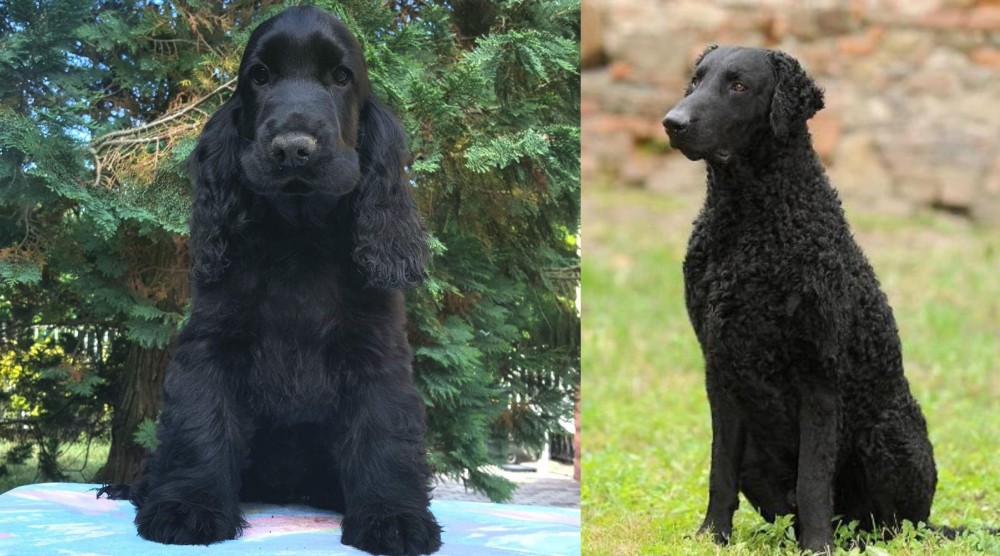 American Cocker Spaniel is originated from United States but Curly Coated Retriever is originated from United Kingdom. American Cocker Spaniel may grow 29 cm / 11 inches shorter than Curly Coated Retriever. American Cocker Spaniel may weigh 26 kg / 57 pounds lesser than Curly Coated Retriever. Both American Cocker Spaniel and Curly Coated Retriever has almost same life span. American Cocker Spaniel may have less litter size than Curly Coated Retriever. American Cocker Spaniel requires Moderate Maintenance. But Curly Coated Retriever requires Low Maintenance
American Cocker Spaniel is originated from United States but Curly Coated Retriever is originated from United Kingdom. American Cocker Spaniel may grow 29 cm / 11 inches shorter than Curly Coated Retriever. American Cocker Spaniel may weigh 26 kg / 57 pounds lesser than Curly Coated Retriever. Both American Cocker Spaniel and Curly Coated Retriever has almost same life span. American Cocker Spaniel may have less litter size than Curly Coated Retriever. American Cocker Spaniel requires Moderate Maintenance. But Curly Coated Retriever requires Low Maintenance
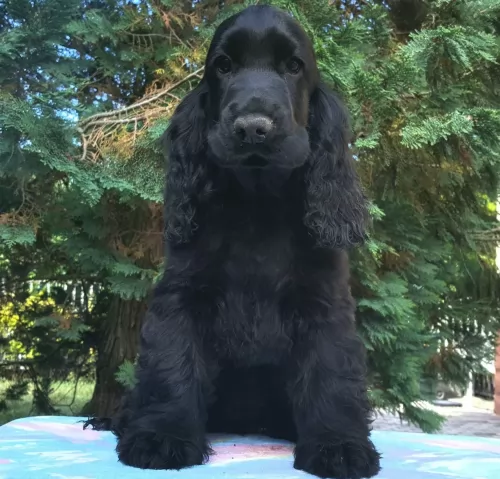 Descended from the English Cocker Spaniel when the latter were brought to the United States in the late 1800s. American hunters wanted a smaller dog for bird hunting, so they crossed them with smaller spaniel breeds. The English and the American Cockers were considered the same breed until 1935 when the American Kennel Club officially separated them into 2 distinct breeds. After this the American Cocker’s popularity increased dramatically.
To this day they are one of the most popular breeds in the U.S. Recently their popularity has spread back to England. The American Cocker Spaniel has evolved from a hunting dog life to a very popular family pet.
Descended from the English Cocker Spaniel when the latter were brought to the United States in the late 1800s. American hunters wanted a smaller dog for bird hunting, so they crossed them with smaller spaniel breeds. The English and the American Cockers were considered the same breed until 1935 when the American Kennel Club officially separated them into 2 distinct breeds. After this the American Cocker’s popularity increased dramatically.
To this day they are one of the most popular breeds in the U.S. Recently their popularity has spread back to England. The American Cocker Spaniel has evolved from a hunting dog life to a very popular family pet.
 There isn’t much on the origin of the Curly-Coated Retriever and his history hasn’t been well documented.
There isn’t much on the origin of the Curly-Coated Retriever and his history hasn’t been well documented.
The dog originated some time ago in the early 19th century, with some believing that the dog was in England during the late 1700s already.
It is thought that this dog, which is identical to the Labrador but with a tight, curly coat, descended from the Old English Water Dog, the Irish Water Spaniel and the smaller Newfoundland. This mix was later crossed with the Poodle and this is where the curls come into the picture.
The Curly-Coated Retriever gained substantial recognition in England during the mid-1800s and exported to the United States in 1907. The dog was also later exported to Australia and New Zealand and has been recognized by the American Kennel Club in 1924.
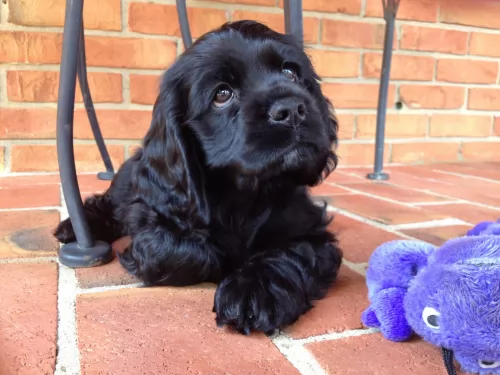 The American Cocker spaniel is a sturdy dog of medium size. The have a rounded head with a broad and deep muzzle. The jaw is even and square while the teeth have a scissors bite. The American Cocker has round eyes that are almost always dark with the exception of the Merle who can have blue colored eyes. They have long ears and a docked tail in the U.S. Docking is illegal in most of Europe. The American Cocker bred for field hunts have shorter coats than those bred for show. Grooming is essential for this longhaired breed. It is especially important for the eyes and ears to be kept clean.
The American Cocker spaniel is a sturdy dog of medium size. The have a rounded head with a broad and deep muzzle. The jaw is even and square while the teeth have a scissors bite. The American Cocker has round eyes that are almost always dark with the exception of the Merle who can have blue colored eyes. They have long ears and a docked tail in the U.S. Docking is illegal in most of Europe. The American Cocker bred for field hunts have shorter coats than those bred for show. Grooming is essential for this longhaired breed. It is especially important for the eyes and ears to be kept clean.
 The Curly Coated Retriever is a medium sized dog standing at about 58–69cm and weighing anything between 25 – 40kg. The dog, mainly black or chocolate brown, is active and muscled and was used for hunting and retrieving waterfowl.
The Curly Coated Retriever is a medium sized dog standing at about 58–69cm and weighing anything between 25 – 40kg. The dog, mainly black or chocolate brown, is active and muscled and was used for hunting and retrieving waterfowl.
The coat has small, tight curls over the body except for the face and the legs. He has floppy ears and they eyes of the black dog are brown while in the liver-colored dogs, the eyes are amber or gold.
The tail is long. He has a wedge shaped head, and its the fact that the face is more long than wide which makes him easily distinguishable from other retriever breeds. Of course, it is the curly coat which is the dog’s most distinguishing feature.
The Curly Coated Retriever has been used as a gun dog, and today, like most retrievers, they make superb pets and are a lively, social and fun-loving breed. He becomes loyal and devoted to his human family members, making a splendid pet, but then he must be exercised.
Have him trained and socialized and he becomes an obedient, relaxed dog, eager to please. He is intelligent and self-confident and gets on well with children in the home as well as with other pets.
He fits in easily to city and country life, but if he could have large grounds to run, play and swim, which he loves, he would be at his happiest.
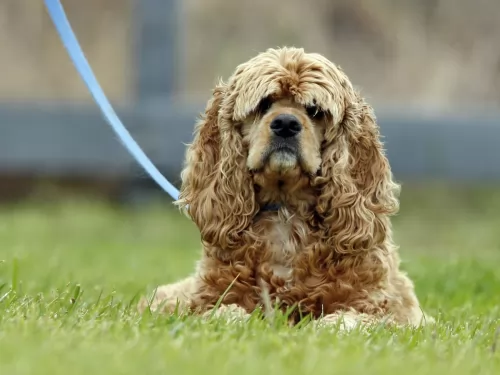 This is a gentle, happy dog. They are high energy, high spirited, friendly dogs who like people and other animals alike. They are happy to be with you and want to please you. He can find a home in the country and in the city alike. He is inquisitive and easy to train.
This is a gentle, happy dog. They are high energy, high spirited, friendly dogs who like people and other animals alike. They are happy to be with you and want to please you. He can find a home in the country and in the city alike. He is inquisitive and easy to train.
But be warned they can be stubborn and hard to housebreak. They can be shy and need a lot of socialization as a pup. They can take over a household if you are not the strong pack leader they need. They have a tendency to urinate when excited and must live inside with the family. They are far too social to be left outside. An unhappy, unstable cocker can be into resource guarding of things, spaces and people. They can bark obsessively or be hyperactive. They must have a loving home with the family.
 Curly Coated Retrievers are such fun dogs, full of personality, robust and active. He makes such a wonderful pet and is loving, loyal and protective. He is brave, courageous, independent and confident as well. He gets on well with children and loves to be part of all their games. He is capable of getting on well with other animals in the home.
Curly Coated Retrievers are such fun dogs, full of personality, robust and active. He makes such a wonderful pet and is loving, loyal and protective. He is brave, courageous, independent and confident as well. He gets on well with children and loves to be part of all their games. He is capable of getting on well with other animals in the home.
He is an active dog and won’t fit in well with those who like to sit around all day. He wants to be active, and then loves to settle down with his human family at night. He is an excellent all-rounder and makes a loving, loyal pet.
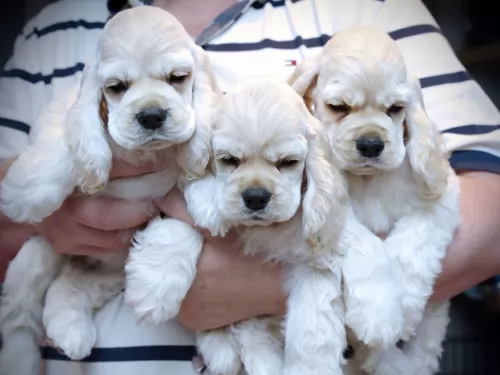 Perhaps the least of the American Cocker Spaniel’s health concerns are the tendency to overeat and become obese. The more serious concerns include glaucoma, cataracts, dysplasia, allergies, Cherry eye, lip fold pyoderma, liver disease, cardiomyopathy, and congestive heart failure (CHF).
Perhaps the least of the American Cocker Spaniel’s health concerns are the tendency to overeat and become obese. The more serious concerns include glaucoma, cataracts, dysplasia, allergies, Cherry eye, lip fold pyoderma, liver disease, cardiomyopathy, and congestive heart failure (CHF).
The most serious health issue the breed faces is IMHA or Immune Mediated Hemolytic Anemia which can be deadly. In fact, it is almost always fatal and comes on quickly. With this condition the dog can bleed out internally and there is little that veterinary medicine can do.
 With good care, the average life expectancy of the Curly-Coated Retriever can reach between 10 and 12 years. However, there are some health concerns that your dog may have to contend with and which are common in most other dog breeds too.
With good care, the average life expectancy of the Curly-Coated Retriever can reach between 10 and 12 years. However, there are some health concerns that your dog may have to contend with and which are common in most other dog breeds too.
Apart from hip dysplasia, bloat, dental decay and eye diseases such as cataracts, ear infections are a common canine health problem, particular when your dog has floppy ears and loves the water.
Ear infections can also be caused because of bacteria, ear mites, allergies and hair growth in the ear canal. Your pet will shake his head, maybe off balance and be scratching his ear. You might notice his ears are red and oozing. Get him to the vet immediately.
When you brush your dog, check for fleas and ticks. Worms too, can make your dog ill, and can actually be the death of a puppy. Worms can cause weight loss, a rough, dull coat and a generally run-down appearance. Your vet will be able to guide you as to what medications are available.
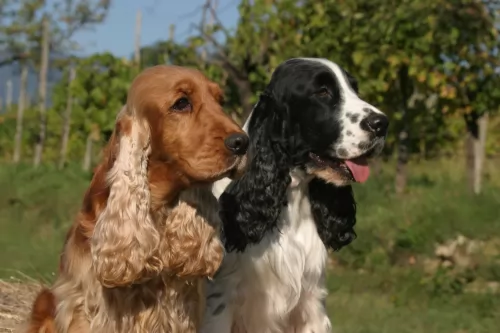 The American Cocker Spaniel breed requires attention to detail and making sure your puppy gets enough and your adult doesn’t get too much. Feed the pups twice a day until they reach the age of 4 months and then cut them back to the adult dose of once a day at supper time. Feed from a cup to a cup and a half.
The American Cocker Spaniel breed requires attention to detail and making sure your puppy gets enough and your adult doesn’t get too much. Feed the pups twice a day until they reach the age of 4 months and then cut them back to the adult dose of once a day at supper time. Feed from a cup to a cup and a half.
not previously mentioned include Ectropion and Entropion, Prolapse of the nicititans gland, gastric torsion and elbow dysplasia. Have your puppy tested for eye diseases and any issues with the knee and hip. These are social dogs and will not do well alone outside. They need to live inside.
The American Cockers love to play and need a lot of exercise. Nice long walks, games of fetch or even agility will keep your Cocker happy. have plenty of stamina and need regular exercise. They also enjoy a good hunt.
 The Curly Coated Retriever is a single-coated dog breed and this makes him a low maintenance dog. He doesn’t shed much and a good brush twice a week will keep the curly coat in good condition. There are some dog owners that trim the feathering around the legs, feet, tail and belly.
The Curly Coated Retriever is a single-coated dog breed and this makes him a low maintenance dog. He doesn’t shed much and a good brush twice a week will keep the curly coat in good condition. There are some dog owners that trim the feathering around the legs, feet, tail and belly.
The Curly Coated Retriever is an attractively low maintenance breed. Therefore he doesn’t require any special diet. He does well on a top quality manufactured dog food where protein is listed at the top.
These dogs are inclined to put on weight easily so you want to be sure to follow the directions on the packaging and not overfeed him. With his kibble, sometimes add in some cooked brown rice, vegetables and chicken.
Raw meat can be expensive but if you can, try and include it into your pet’s diet to avoid nasty skin rashes and allergies. Always make sure that cool, fresh water is available to your dog and make sure the food and water bowls are regularly washed.